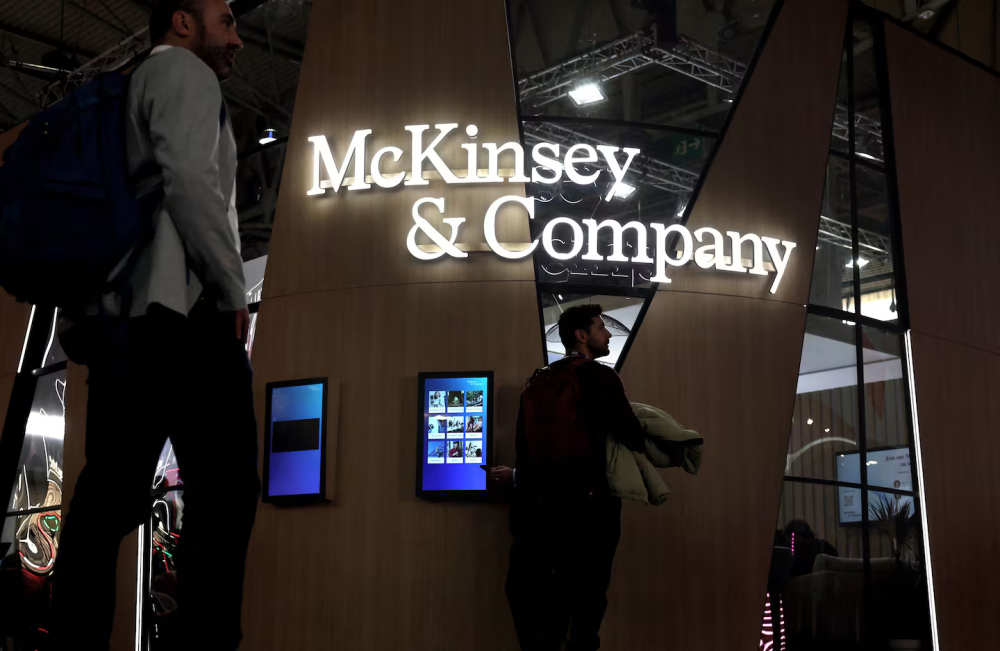- The Massachusetts Legislature proposed raising court-appointed lawyers’ pay by $20 an hour over two years to end the work stoppage that has paralyzed the state’s criminal courts. Massachusetts relies heavily on such lawyers to represent poor defendants, and the Legislature’s plan would also hire more state-employed public defenders.
- Brown University reached a deal to restore $50 million in federal research funding and settle the Trump administration’s claims that it failed to protect Jewish students. Unlike Columbia, Brown won’t pay the federal government; it will instead support groups in Rhode Island.
- Former vice president Kamala Harris won’t run for California governor next year, a possible step toward seeking the presidency again in 2028.

McKinsey tiết lộ công cụ AI giúp tiết kiệm hơn 1 ngày làm việc mỗi tuần cho nhân viên
-
McKinsey & Company đã phát triển Lilli, một nền tảng AI tùy chỉnh ra mắt vào tháng 7/2023, nhằm xử lý và khai thác hơn 65.000 tài liệu PowerPoint và dữ liệu nội bộ khổng lồ.
-
Lilli được xây dựng như một “orchestration layer”, tích hợp 11 mô hình AI khác nhau, có thể trả lời câu hỏi, tạo bản trình chiếu, sửa văn bản theo phong cách riêng của công ty và đề xuất người liên hệ nội bộ phù hợp.
-
Tên Lilli được đặt theo Lillian Dombrowski – phụ nữ chuyên nghiệp đầu tiên được McKinsey tuyển dụng vào năm 1945.
-
Trong thử nghiệm, Lilli có thể phân tích chuỗi giá trị của ngành pin xe điện chỉ trong vài giây và đưa ra danh sách có chú thích như trang Wikipedia.
-
Hai năm sau khi ra mắt, khoảng 2/3 nhân viên toàn cầu của McKinsey sử dụng Lilli hàng tháng, và hơn 40% sử dụng hàng tuần.
-
Một tính năng nổi bật khác là “AI agents” – trợ lý ảo có thể hoàn thành các nhiệm vụ phức tạp mà không cần lệnh mới.
-
McKinsey hiện đang phát triển phiên bản có giọng nói cho Lilli, với giọng nói năng động và thân thiện.
-
Mỗi tuần, Lilli giúp tiết kiệm trung bình hơn 1 ngày làm việc cho một tư vấn viên, góp phần cân bằng công việc và cuộc sống.
-
Các công ty tại Massachusetts lo ngại về bảo mật dữ liệu, sự phản đối từ nhân viên và khả năng sa thải do AI, theo khảo sát của Greater Boston Chamber of Commerce.
-
McKinsey cho rằng kỹ năng “prompting” sẽ là năng lực cốt lõi trong tương lai của lực lượng lao động, và AI có thể thúc đẩy tăng trưởng tuyển dụng nếu ứng dụng thành công.
📌 McKinsey đã cách mạng hóa hoạt động tư vấn bằng Lilli – nền tảng AI kết hợp 11 mô hình, giúp 2/3 nhân viên toàn cầu tiết kiệm hơn 1 ngày làm việc mỗi tuần. Từ tạo slide, truy vấn thông tin nội bộ cho đến hỗ trợ bằng giọng nói và agent tự động, Lilli đang định hình lại cách các công ty vận hành, bất chấp những lo ngại về bảo mật và lao động.
https://www.bostonglobe.com/2025/07/31/newsletters/starting-point-artificial-intelligence-mckinsey-lilli-boston/
This top consulting firm is using AI to revolutionize its business. I saw it in action.
I met “Lilli,” McKinsey’s custom-build AI platform, in the company’s Boston offices. It does research, makes slideshows, and talks back.
Thảo luận
Follow Us
Tin phổ biến



